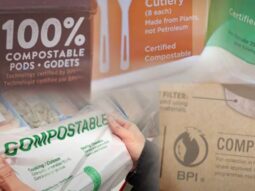 Making “Compostable” Products Truly Compostable (start time: 0:56) You’ve probably wracked your brain at some point trying to figure out whether the compostable-labelled clamshell or the green-tinted plastic cup you got at a restaurant is truly compostable. Many products contain misleading and outright false claims, leaving consumers confused about how to do good by the planet. Indeed, tons of food and yard waste, as well as organic food-packaging products, end up in landfills, where they decompose under anaerobic conditions and generate methane, a greenhouse gas far more potent, if shorter-lasting, than carbon dioxide. Organic waste from landfills and wastewater is the third largest source of human-related methane emissions, after livestock and oil and gas emissions, according to the Rocky Mountain Institute.
Making “Compostable” Products Truly Compostable (start time: 0:56) You’ve probably wracked your brain at some point trying to figure out whether the compostable-labelled clamshell or the green-tinted plastic cup you got at a restaurant is truly compostable. Many products contain misleading and outright false claims, leaving consumers confused about how to do good by the planet. Indeed, tons of food and yard waste, as well as organic food-packaging products, end up in landfills, where they decompose under anaerobic conditions and generate methane, a greenhouse gas far more potent, if shorter-lasting, than carbon dioxide. Organic waste from landfills and wastewater is the third largest source of human-related methane emissions, after livestock and oil and gas emissions, according to the Rocky Mountain Institute.
On this week’s show, host Susan Moran interviews Dan Matsch, the director of the Compost Department at Eco-Cycle in Boulder; and Nora Goldstein, editor and publisher of BioCycle, about a new product-labeling law in Colorado and other efforts to hold product manufacturers accountable, and to clean up the waste stream.
(Click here for the Compostable Labeling Complaint Form in Colorado. And listen to our recent “The Dirt on Composting” show.)
Host/ Show Producer: Susan Moran
Engineers: Jackie Sedley, Greta Kerkhoff
Executive Producer: Susan Moran
Listen to the show here:
Podcast: Play in new window | Download (Duration: 26:24 — 36.3MB)
Subscribe: RSS


